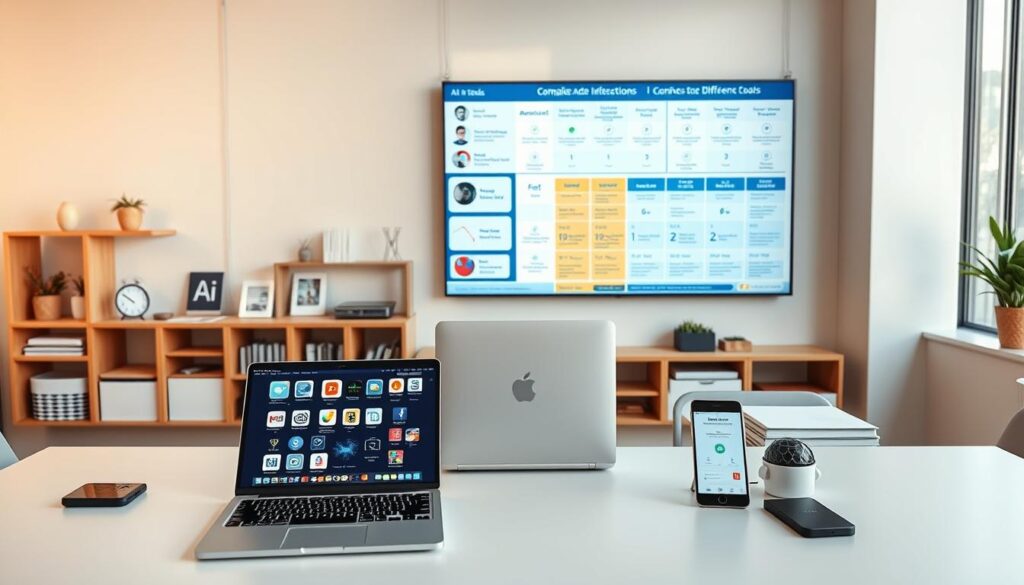As artificial intelligence changes many fields, it’s key for people to learn about AI technology. For newcomers, finding the right resources can seem hard.
But, many free AI tools and AI apps2025 are now easy to find. They help beginners get into AI. These tools give hands-on experience and teach about AI uses.
Using these free resources, people can learn a lot about AI. This opens doors for more learning and discovery.
Key Takeaways
- Free AI tools are essential for beginners to gain practical experience in artificial intelligence.
- AI apps2025 offer a range of applications that cater to different aspects of AI technology.
- Artificial intelligence for beginners is made more accessible through these free resources.
- Utilizing free AI tools can significantly enhance one’s understanding of AI concepts.
- Exploring AI apps2025 can provide insights into the latest developments in AI technology.
The AI Revolution: What Beginners Need to Know in2025
Artificial intelligence is now a part of our lives in 2025. It’s not just a dream anymore. AI has become easier to use, thanks to its fast growth. Knowing how AI works and what it can do is key.
How AI Is Transforming Everyday Tasks
AI is making our daily tasks more efficient. It’s in our virtual assistants and smart home devices. AI helps with scheduling, email, and even writing.
The Democratization of AI Technology
AI is now open to everyone, thanks to easier tools. This change is thanks to apps and tools that are easy to use.
From Expensive Software to Free Accessible Tools
AI tools have changed a lot. Now, many are free and easy to use. This brings several benefits:
- Cost-effectiveness: Many AI tools are now free or offer freemium models.
- Ease of use: User-friendly interfaces make it easy for beginners to navigate and utilize AI tools.
- Innovation: The availability of free AI tools fosters innovation and creativity among users.
Best AI Tools You Can Use for Free in2025

In 2025, AI has made big steps forward. Now, we have many free tools for different needs. These tools help with making content and analyzing data, making AI easy to use for everyone.
How We Selected These Tools
We picked tools based on their power, ease of use, and value. We looked for tools that are strong but also easy to use. This way, both beginners and experts can use them well.
The criteria included:
- Functionality and features
- Ease of use and user interface
- Value proposition and limitations
- User reviews and ratings
Free vs. Freemium: Understanding the Limitations
It’s key to know the difference between free and freemium tools. Free tools have basic features, while freemium tools offer more for a fee. Knowing this helps users get the most from these tools.
For example, some free AI tools might have limits on how much you can use them or the quality of what they produce. Knowing these limits helps plan your work better.
Getting Maximum Value from Free Tiers
To get the most from free AI tools, follow these tips:
- Know what the tool can do and what it can’t.
- Use it for tasks it’s good at.
- Try out different features to find the best way to work.
By doing these things, you can work more efficiently and effectively.
| Tool | Primary Function | Free Tier Limitations |
|---|---|---|
| ChatGPT | Content Generation | Limited to basic model, slower response times |
| DALL-E Mini | Image Generation | Lower resolution images, limited generations per day |
| Google Gemini | Content Generation, Translation | Limited access to advanced features, usage caps |
As shown in the table, each tool has its own strengths and weaknesses. The right tool depends on what you need.
First Steps with AI: A Beginner’s Roadmap
Starting your AI journey can be thrilling and a bit scary. But, with a good roadmap, beginners can easily explore this complex field. It’s important to build a strong foundation as we enter the world of artificial intelligence.
Setting Realistic Expectations
When you start with artificial intelligence for beginners, remember AI is a tool, not a magic wand. It can help with tasks, offer insights, and improve decision-making. But, it needs data and the right setup to work well. Setting realistic goals helps avoid disappointment and keeps you focused.
Basic AI Terminology You Should Know
Learning basic AI terms is a crucial step. Words like machine learning, deep learning, and neural networks are key. Knowing these will help you understand AI better and its many uses.
Practical Learning Resources for AI Beginners
For deeper learning, many resources are out there. Online courses on Coursera and edX, YouTube tutorials, and AI blogs are full of info. Also, joining AI forums and communities can give you great support and insights.
By setting realistic goals, learning basic terms, and using available resources, beginners can start their AI journey well.
Free AI Writing and Content Creation Tools

In 2025, free AI writing tools are making content creation easy for everyone. These tools boost productivity and open up new creative paths in writing and content making.
ChatGPT Free Tier: Capabilities and Limitations
ChatGPT’s free tier is a top choice for free AI writing tools. It helps create top-notch content, like blog posts and social media posts. It can generate text, summarize, and translate. But, it’s important to know its limits, like outdated info and the need for human checks.
Google Gemini: The Free Alternative
Google Gemini is another free tool with great features. It’s known for understanding and creating language well. It’s great for making content, brainstorming, and research. Comparing it to ChatGPT helps pick the right tool for your needs.
Step-by-Step: Creating Your First AI-Generated Content
Making AI content is easier than you think. Here’s how to do it:
- Choose your AI tool (e.g., ChatGPT or Google Gemini).
- Define what you need, like topic, tone, and length.
- Put your needs into the tool and get content.
- Check and edit the content to meet your standards.
As
“AI is not just a tool, it’s a collaborator that can enhance human creativity and productivity.”
, AI is a game-changer in content creation.
Free AI Image Generation Tools for Non-Designers
AI apps in 2025 are changing how we make images. Now, anyone can create professional-looking visuals without needing design skills. Free AI image generation tools have made this possible.
DALL-E Mini and Other Free Generators
DALL-E Mini is a top choice for free AI image tools. It uses a simplified version of the DALL-E algorithm. Users can make images by typing what they want to see.
Other free tools to check out include:
- Craiyon: Creates images from text descriptions.
- Stable Diffusion: An open-source model for high-quality images.
Canva’s AI Features on the Free Plan
Canva, a well-known design platform, now has AI on its free plan. Users can make images, edit photos, and design with AI tools. Its easy-to-use interface helps non-designers create great visuals.
Canva’s free plan offers:
| Feature | Description |
|---|---|
| AI Image Generation | Create custom images from text prompts. |
| Photo Editing | Use AI to enhance and edit photos. |
| Design Templates | Access many pre-designed templates. |
Prompt Engineering for Better Image Results
The quality of images depends on the text prompt. Prompt engineering is about writing good prompts. By using specific keywords and details, users can get better results.
“The best way to get good results from AI image generators is to be as specific as possible with your prompts. Describe the scene, the colors, the mood – everything that can help the AI understand your vision.”
Learning prompt engineering and using tools like DALL-E Mini and Canva can help non-designers make amazing visuals. These visuals can improve any project or communication.
Free AI Audio and Video Creation Tools

In 2025, creators can use free AI tools to make top-notch audio and video content easily. These tools are changing how we make content, making it simpler for beginners.
Text-to-Speech Tools with Natural Voices
AI has made text-to-speech tools much better, creating voices that sound real. Google’s Text-to-Speech and Amazon’s Polly have free versions. They let users make great voiceovers for videos, podcasts, and more.
Basic Video Editing with AI Assistance
AI is making video editing easier for everyone. Clipchamp and InShot are tools that help with editing. They do things like trim videos, add transitions, and adjust colors automatically.
Creating Podcasts and Voice Content with AI
AI is also changing podcasting and voice content. Descript and Podcastle have AI features like transcription, editing, and voice cloning. This makes making and editing podcasts easier.
These free AI tools are making content creation easier and more fun. They let creators try out new things and styles.
Free AI Translation and Language Learning Assistants

Free AI translation and language learning tools are changing how we talk across languages. They help break down language barriers and make learning languages easier and faster.
Beyond Google Translate: Advanced Free Options
Google Translate is well-known, but there are better free AI translation tools out there. DeepL gives very accurate translations for European languages. Microsoft Translator lets you translate in real time across many languages.
Language Learning Accelerated by AI
AI is also changing how we learn languages. Duolingo uses AI to create learning plans just for you. This makes learning more fun and effective.
Real-Time Translation for International Communication
Real-time translation is key for talking across languages, whether for work or travel. Tools like iTranslate offer voice and text translation on the fly. This helps make conversations smoother.
Here’s a comparison of some popular free AI translation tools:
| Tool | Key Features | Supported Languages |
|---|---|---|
| DeepL | Highly accurate translations | European languages |
| Microsoft Translator | Real-time translation | Multiple languages |
| iTranslate | Real-time voice and text translation | Over 100 languages |
As AI gets better, we’ll see even more advanced language tools. These will help us talk across languages even better.
Free AI Productivity and Automation Tools
Free AI tools are changing how we work. They offer new ways to boost productivity and automate tasks. These tools help make our work easier and more efficient.
Email Management and Writing Assistants
AI tools can manage your emails for you. Boomerang and Sanebox sort emails and send replies. Grammarly also helps with writing, suggesting better grammar and style.
Task Automation Without Coding Skills
Now, anyone can automate tasks without coding. Zapier and IFTTT (If This Then That) make it easy. They let you set up workflows without coding.
Setting Up Your First AI Workflow
To start, find tasks that take up too much time. Look for AI tools to automate them. For example, Zapier can link your email to your task list, making tasks from emails.
Start with simple automations. Then, get more complex as you learn more. These tools can make your work more efficient and save time.
Free AI Tools for Data Analysis and Visualization
Now, getting insights from complex data is easier than ever. Free AI tools for data analysis and visualization make it simple. They help artificial intelligence for beginners start with data analysis without needing a lot of technical knowledge.
Making Sense of Complex Data Without Statistics Background
AI tools are great because they make complex data simple. Google’s Data Studio lets users connect to their data and make interactive, web-based visualizations. This way, anyone can get useful insights from their data, even without a stats background.
Creating Professional Charts and Graphs Automatically
AI tools can automatically make professional charts and graphs. This saves time and makes data look better. For example, Infogram has a free version that uses AI to create nice data visualizations.
From Spreadsheets to Insights in Minutes
AI tools make turning raw data into useful insights quick and easy. Platforms like Microsoft Power BI have free versions. They let users upload spreadsheets and find trends and patterns in minutes with AI analytics.
With these free AI tools, beginners can easily analyze and visualize their data. This makes making data-driven decisions more accessible than ever.
Protecting Your Privacy While Using Free AI Tools
Free AI apps are getting more popular in 2025. It’s vital to keep your privacy safe. Knowing the risks is key to enjoying these tools without worry.
Understanding Data Collection Policies
Free AI tools collect data to make their services better. It’s important to know what data they take and how they use it. Most services explain this in their terms of service, but it can be hard to understand.
Key aspects to look for include:
- What type of data is collected?
- How is the data stored and protected?
- Is the data shared with third parties?
- Can you opt-out of data collection?
Strategies to Maintain Privacy
To keep your privacy safe, try these tips:
- Read and understand the privacy policy before agreeing to it.
- Use minimal personal data when signing up or using the service.
- Regularly review and update your privacy settings.
- Consider using privacy-focused browsers or browser extensions.
Red Flags to Watch For in Terms of Service
When looking at terms of service, watch out for anything that seems too broad or invasive. Be cautious of services that:
| Red Flag | Description |
|---|---|
| Overly broad data collection | Collecting more data than necessary for the service. |
| Data sharing without consent | Sharing user data with third parties without explicit consent. |
| Lack of transparency | Not clearly outlining how user data is used or protected. |
A privacy expert once said,
“The devil is in the details when it comes to privacy policies. Users must be vigilant and understand what they’re agreeing to.”
By staying informed and careful, you can use free AI tools safely and enjoy them.
Building Your Personal AI Toolkit: Integration Strategies
In 2025, the secret to unlocking AI’s full power is combining different AI tools and technologies. As a beginner, learning how to integrate these tools is key. It helps make your workflows better.
Combining Tools for Enhanced Workflows
To boost productivity, you can mix AI tools in many ways. For example, using ChatGPT with a grammar and style checker can greatly improve your writing. Here are some strategies:
- Find tools that work well together.
- Use AI image generation tools like DALL-E Mini with Canva’s AI for design.
- Integrate text-to-speech tools with video editing software for multimedia.
When to Upgrade to Paid Versions
Free AI tools are great, but sometimes, paid versions are better. Upgrade when you need:
- More advanced features not in the free version.
- Higher usage limits for bigger projects or more work.
- Better support and detailed guides.
Future-Proofing Your AI Skills for 2025 and Beyond
To keep up with AI’s fast changes, keep learning. Focus on the newest AI tech and trends. Join online groups, go to webinars, and join AI forums to stay current.
Conclusion: Embracing AI as a Beginner in2025
In 2025, artificial intelligence is easier to get into, especially for newbies. There are many free AI tools and apps available. They can make your work, creativity, and learning better.
AI is no longer scary for beginners. Thanks to AI technology becoming more open, you can use it without needing to be a tech expert. The free AI tools mentioned here are great for starting your AI adventure. They help with writing, making content, and understanding data.
Keep up with the latest in AI as you dive deeper. Always think about keeping your data safe when using free AI tools. By starting with AI in 2025, you can open up new chances, improve your skills, and lead in a world where AI is key.

